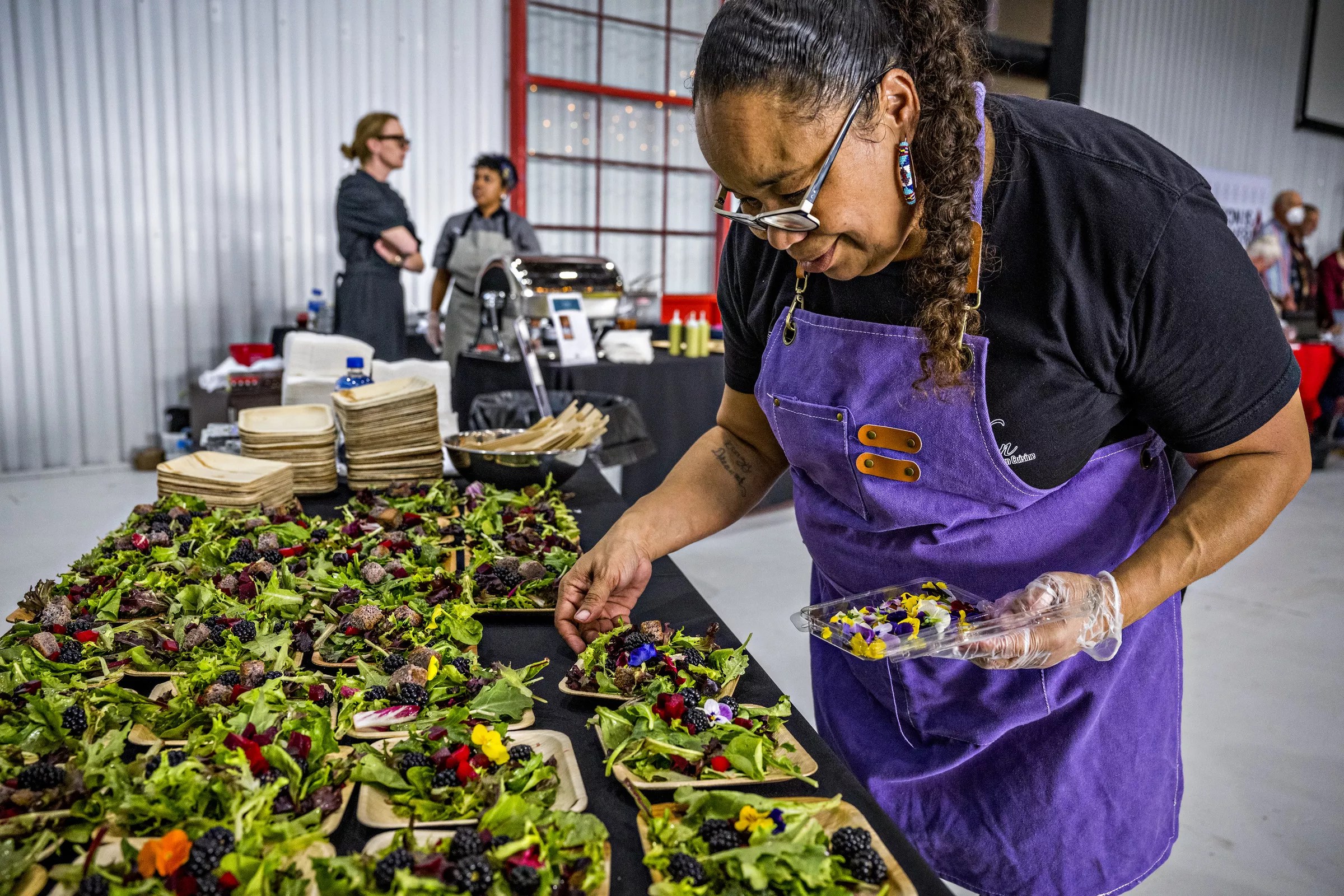
American Indian College Fund

Audio By Carbonatix
Make an impact and connect with Colorado’s vibrant Native community at Denver EATSS, a fundraiser celebrating Indigenous cuisine, art and music.
On April 11-12, EATSS will host a tasting event at the Denver Performing Arts Complex with Indigenous chefs, followed by a music performance starring Nathaniel Rateliff and the Colorado Symphony, as well as guest opener Raye Zaragoza. The festivities will also include an art exhibition by students at the Institute of American Indian Arts, a school in Santa Fe, New Mexico, that’s one of 35 accredited tribal colleges and universities that provide higher education opportunities on or near reservation lands. Since its establishment in 1989, the Denver-based American Indian College Fund has awarded TCU students more than $185 million in scholarships.
Also hosted in New York City and the Twin Cities, EATSS is one of the nonprofit’s key fundraising events. However, it’s also motivated by another goal: to introduce individuals to Native people and culture.
What to expect at Denver EATSS
Priced at $150 per, EATSS-only tickets allow guests to sample dishes from four chefs: Sherry Pocknett, a member of the Mashpee Wampanoag tribe and the first Indigenous woman to win a James Beard Award (“Best Chef Northeast”); Paul Natrall of the Squamish Nation, an expert in ancient cooking methods and traditional ingredients; Tocabe co-founder Ben Jacobs, who built the country’s largest Native American restaurant chain around his Osage family’s recipes; and Andrea Condes of Four Directions Cuisine, an Indigenous food and education business that offers private events, catering and programming related to culinary arts and agriculture.
“Founding 4DC was an extension of my journey to reconnect with culture and self as a transracial adoptee,” says Condes, an Andean chef who was born in Venezuela. During Denver EATSS, she will serve a “dueling arepas” dish in honor of her heritage.
“One arepa is prepared with a potato and quinoa dough base – both highly regarded and sacred ingredients from South America,” she notes. “That is topped with pickled squash, heirloom bean purée and heirloom corn, which is a nod of respect for the Three Sisters significance’ (squash, beans, corn) in North American Indigeneity.”
The other arepa features a traditional corn dough stacked with avocado purée, plantain chips and smoked Alamosa striped bass sourced from Colorado Catch. Whenever possible, Four Directions Cuisine prioritizes partnerships with in-state and native-owned businesses, Condes notes.

Denver-based participating chefs include Tocabe co-founder Ben Jacobs and Andrea Condes of Four Directions Cuisine.
American Indian College Fund
“The chefs come prepared to talk about their food,” notes NancyJo Houk, chief marketing and development officer at the American Indian College Fund. Unlike some fast-paced food festivals, Denver EATSS encourages engagement between chefs and guests, who don’t need to be shy about asking questions – or asking for seconds.
The culinary portion of the evening, hosted at the Ellie Caulkins Opera House’s Studio Loft, will run from 5 to 7 p.m. Then, those who opt for the EATSS-and-concert combo, which starts at $230, will head to Boettcher Concert Hall.
Indigenous singer-songwriter Raye Zaragoza will open, followed by Nathaniel Rateliff alongside the Colorado Symphony. Rateliff has previously partnered with the American Indian College Fund through his foundation, The Marigold Project, which supports community organizations and nonprofits related to economic, racial and social justice.
An advocate for Indigenous rights, Rateliff says: “Since I was young, I have been interested in Native American culture and religion, and the effects of American expansion on their people and communities. Initiatives like the American Indian College fund have a direct impact on the future of Indigenous Americans throughout Colorado and the country.”
How Native students benefit from Denver EATSS
“It is empowering for our students to tell their stories in the way that they want them to be told,” says Houk. She began working for the American Indian College Fund twelve years ago and quickly noticed a common sentiment among students, with many expressing a lack of representation outside of their communities.
In general, she adds, these individuals’ experiences differ from those of traditional college students. For example, many are the breadwinners in their families, working a couple of jobs on top of attending school full-time. “A lot of our students live in their reservation communities where there’s food insecurity and housing shortages,” she explains. “The majority of the financial responsibility for taking care of dependents, either elder or younger, falls squarely on their shoulders while they’re working toward their degree.”
Additionally, higher education is not the norm among Indigenous groups. Houk says that in her time working with the American Indian College Fund, she’s seen the number of Native Americans with a bachelor’s or more advanced degree rise from 11 to 17 percent – a significant win, but still far less than the national average of 37 percent per the 2022 U.S. Census Bureau.
While financial support is crucial for these students, Denver EATSS also provides them with a platform to be seen and heard. “It’s an opportunity for students to share the things about themselves that they want people to know – to share their culture and their ancestral knowledge, as well as the experiences that they’re having in today’s world,” says Houk.
She concludes, “When you show up for Native students, you mean more to them than what you could ever really know.”
Find the complete Denver EATSS schedule and tickets here.